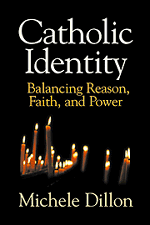Book contents
- Frontmatter
- Contents
- Acknowledgments
- 1 Pro-Change Catholics: Forging Community out of Diversity
- 2 Doctrinal Change in the Catholic Church
- 3 Official Church Teaching on Homosexuality, Women's Ordination, Abortion, and the Role of the Theologian
- 4 Pro-Change Groups in the Contemporary Church: Dignity, the Women's Ordination Conference, and Catholics for a Free Choice
- 5 Gay and Lesbian Catholics: “Owning the Identity Differently”
- 6 Using Doctrine to Critique Doctrine
- 7 Pluralism in Community
- 8 Reasoned Theology: Legitimating Emancipatory Possibilities
- 9 Catholic Options
- Appendix: Research Methodology
- References
- Index
6 - Using Doctrine to Critique Doctrine
Published online by Cambridge University Press: 04 August 2010
- Frontmatter
- Contents
- Acknowledgments
- 1 Pro-Change Catholics: Forging Community out of Diversity
- 2 Doctrinal Change in the Catholic Church
- 3 Official Church Teaching on Homosexuality, Women's Ordination, Abortion, and the Role of the Theologian
- 4 Pro-Change Groups in the Contemporary Church: Dignity, the Women's Ordination Conference, and Catholics for a Free Choice
- 5 Gay and Lesbian Catholics: “Owning the Identity Differently”
- 6 Using Doctrine to Critique Doctrine
- 7 Pluralism in Community
- 8 Reasoned Theology: Legitimating Emancipatory Possibilities
- 9 Catholic Options
- Appendix: Research Methodology
- References
- Index
Summary
The preceding chapter illustrated how participants in Dignity affirm the compatibility of their sexuality and their Catholicism. As documented, Dignity respondents transform the disordered identity given to them in official church teaching by interpreting Catholicism, sexuality, and the church hierarchy in ways that enable them to embrace the Catholic tradition and rework its exclusionary symbols. This chapter focuses more formally on how pro-change Catholics legitimate an emancipatory agenda. Specifically, I examine how members of the Women's Ordination Conference (WOC) and volunteer activists for Catholics for a Free Choice (CFFC) argue for a more participative and pluralistic church, and how in the process they validate the authenticity of their Catholicism.
INSTITUTIONAL AND DOCTRINAL TRANSFORMATION
This chapter will engage important theoretical questions in sociology concerning the prospects and resources for achieving institutional change. As discussed in Chapter 1, Jürgen Habermas views communicative reason as the primary means by which people can reach a negotiated agreement about a course of action that benefits the common good rather than the instrumental interests of particular actors. In Habermas's “ideal speech situation,” participants engage in reasoned communication which is unconstrained by differences between the participants in status, power, and language capabilities, and where the weight of tradition, dogma, and emotional attachments is bracketed. In this model of a deliberative community “no participant has a monopoly on correct interpretation” (Habermas 1984: 100).
- Type
- Chapter
- Information
- Catholic IdentityBalancing Reason, Faith, and Power, pp. 164 - 193Publisher: Cambridge University PressPrint publication year: 1999

